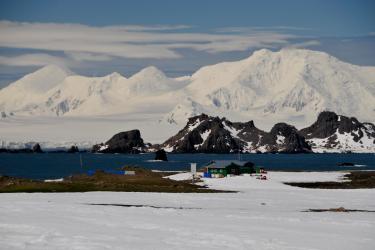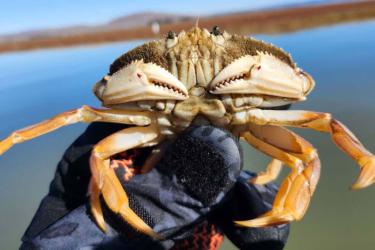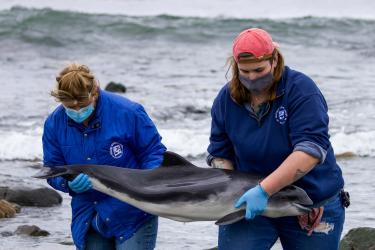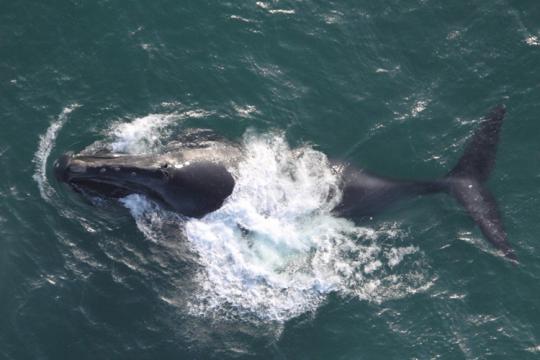In late 2019, the National Science Foundation proposed to fund a high-energy seismic research survey in the Northeast Pacific Ocean. It would take place off the coasts of Oregon, Washington, and Vancouver Island in the summer of 2021. These surveys inform earthquake and tsunami hazards in the highly populated Pacific Northwest. The surveys deploy airguns, which create sound waves that transmit through the water. Any marine life in the area could be affected by the sound, including salmon and Southern resident killer whales, which are culturally important to many Pacific Northwest Tribes.
Through an academic study, the National Science Foundation proposed a marine geophysical survey to collect geological data from Cascadia Subduction Zone. To collect the survey data, the National Science Foundation Research Vessel Marcus G. Langseth would tow airguns that send out sound waves into the water.
This action could impact Tribal commercial and subsistence harvested fish. So, the National Science Foundation and NOAA Fisheries scientists collaborated with affected Tribal governments to find a resolution as part of the Endangered Species Act consultation process. Through diligent efforts by all parties involved, we established a notification process between the Tribes and the seismic survey operators.
Tribal Outreach and Engagement
NOAA Fisheries sent notice of the seismic survey to 18 affected Tribes in Washington, Oregon, and northern California:
- Confederated Tribes of the Chehalis Reservation
- Confederated Tribes of Siletz Indians
- Confederated Tribes of the Coos, Lower Umpqua, and Siuslaw
- Coquille Tribe
- Cow Creek Band of the Umpqua Tribe of Indians
- Cowlitz Indian Tribe
- Hoh Tribe
- Hoopa Tribe
- Karuk Tribe
- Klamath Tribe
- Makah Indian Tribe
- Quileute Tribe
- Quinault Indian Nation
- Shoalwater Bay Tribe
- Tolowa Dee-Ni’ Nation
- Wintu Tribe of Northern California
- Wiyot Tribe
- Yurok Tribe
The COVID-19 pandemic presented challenges; the seismic survey had to be rescheduled from 2020, which meant re-engaging with the affected Tribes in 2021.
In February 2021, NOAA Fisheries held an informational webinar with several representatives from interested Tribes, with support from the National Science Foundation. The webinar presented a summary of the seismic survey and the possible effects of the survey to Tribal resources. The discussion focused on listening to the Tribes’ concerns and responding to questions, as well as how to proceed with the coordination.
Following the webinar, the Makah Tribe sent a letter to NOAA Fisheries formally requesting resolution on several topics related to the survey, including:
- Questions about research opportunities
- Communication with Makah fishermen
- Impacts to marine mammals and fish
In April 2021, NOAA Fisheries hosted a fisheries coordination meeting with representatives from three of the Washington coastal Tribes — Makah, Quinault, and Quileute. We discussed the concerns the Tribes had over the potential impacts to their fisheries, and explored opportunities to coordinate to minimize impacts.
Representatives from the Olympic Coast National Marine Sanctuary, NOAA Fisheries West Coast Region Office of Sustainable Fisheries, the National Science Foundation, and cetacean researchers from the Cascadia Research Collective also attended this meeting. We discussed potential impacts to fish from the seismic survey, the timing of the survey and the possibility of coordinating whale research activities. There was a discussion of a separate fish research project, and how to notify individuals of the survey activity in the Tribe’s Usual and Accustomed Areas for fishing.
Protecting Fisheries and Advancing Science
Working with our Tribal partners ensured Tribal resources were protected and that the National Science Foundation survey was a success. The process highlighted the importance of early engagement with the Tribes and all the parties involved.
Due to the nature of the effects from the seismic survey and its location, the Tribal consultation required involving multiple partners and coordinating the processes for the different statutory authorizations. We needed to incorporate input from all the partners, and coordination was time-intensive; meeting timelines for the consultation was a challenge. Through coordination and the Tribes’ valuable inputs, we were able to understand their concerns and provide the information they needed. We supported the importance of the commercial and subsistence fisheries to the Tribal communities. This experience will help guide us in future consultations.





